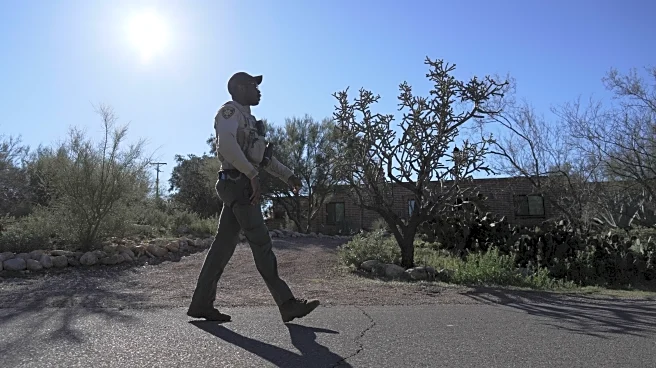Rapid Read • 9 min read
The Pakistani government is defending its response to recent flash floods in the northwest region, which have resulted in the deaths of over 270 people. The floods, triggered by torrential rains and cloudbursts, have devastated the Buner district in Khyber Pakhtunkhwa province. Emergency services have recovered dozens of bodies from collapsed houses, and many villagers remain missing. Residents have criticized officials for failing to provide timely evacuation warnings, which traditionally are broadcast through mosque loudspeakers in remote areas. The government claims that the intensity of the sudden downpour made it impossible to alert residents in time. Lt. Gen. Inam Haider, chairman of the National Disaster Management Authority, stated that Pakistan is experiencing shifting weather patterns due to climate change, with monsoon rains being 50% higher than last year. Authorities are continuing rescue and relief operations, with warnings of more intense weather conditions expected.
AD
The floods highlight the vulnerability of Pakistan to climate-induced disasters, emphasizing the need for improved early warning systems and disaster preparedness. The lack of timely alerts has resulted in significant loss of life and property, underscoring the challenges faced by communities in remote areas. The situation also reflects broader issues related to climate change, as Pakistan, despite contributing less than 1% to global emissions, faces severe weather events. The impact on local communities is profound, with many losing their homes and livelihoods. The government's response and future preparedness measures will be crucial in mitigating the effects of such disasters and protecting vulnerable populations.
Authorities have warned of potential further deluges and landslides, urging local administrations to remain vigilant. Efforts to clear roads and reach cut-off villages are ongoing, with emergency services working to remove debris and search for missing persons. The government may need to reassess its disaster management strategies and invest in more robust early warning systems to prevent future tragedies. Additionally, international cooperation and support may be sought to address the challenges posed by climate change and improve resilience against extreme weather events.
The floods in Pakistan raise ethical and legal questions about the responsibility of governments to protect their citizens from climate-induced disasters. The lack of effective warning systems and preparedness measures highlights the need for policy reforms and investment in infrastructure. Culturally, the reliance on traditional methods of communication in remote areas may need to be reevaluated in favor of more modern and reliable systems. Long-term, the increasing frequency and severity of such events could lead to shifts in population dynamics, with communities potentially relocating to safer areas.
AD
More Stories You Might Enjoy











